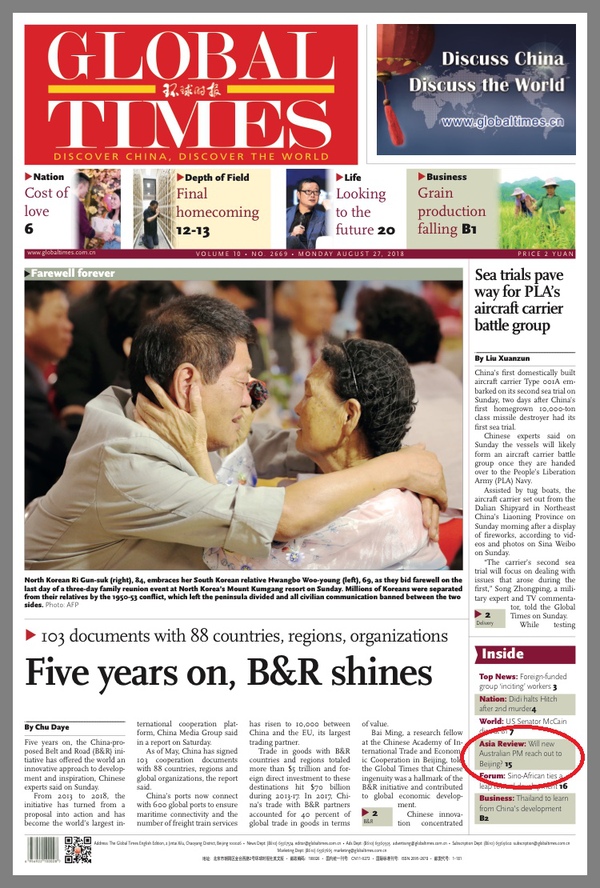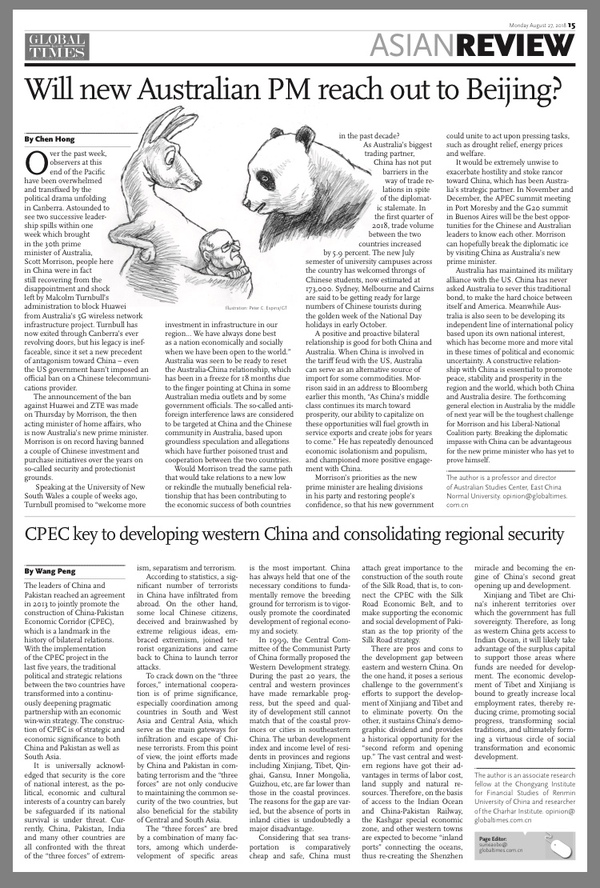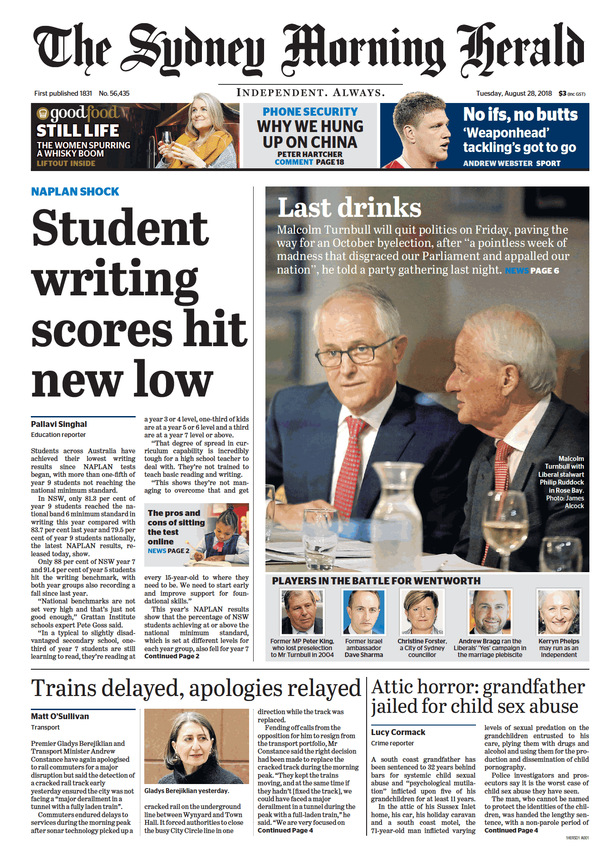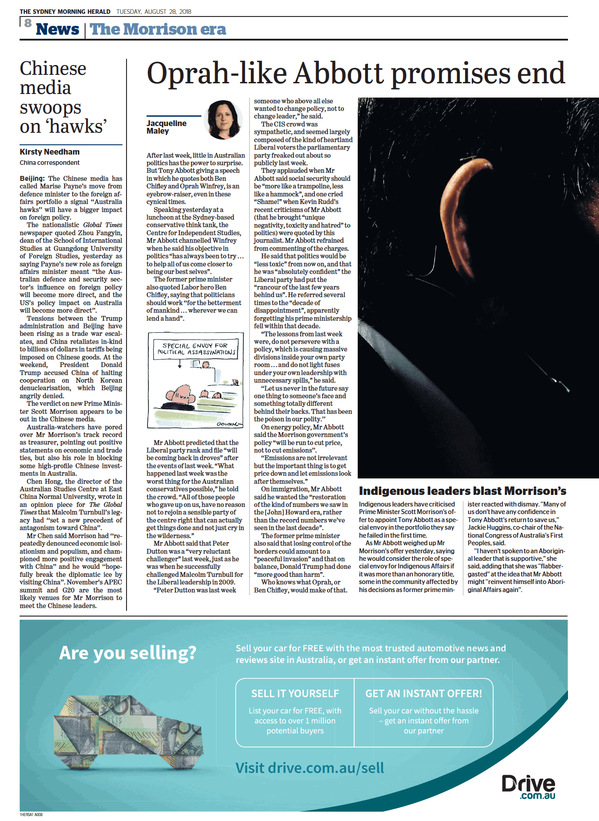我校澳大利亚研究中心主任陈弘近日在《环球时报》英文版发表评论文章,分析澳大利亚政坛变局对中澳关系的影响。文章发表后,受到国内外广泛关注,《悉尼先锋晨报》、墨尔本《时代报》和《南华早报》均先后引述陈弘文章的观点。




Will new Australian PM reach out to Beijing?
By Chen Hong
Source: Global Times
Over the past week, observers at this end of the Pacific have beenoverwhelmed and transfixed by the political drama unfolding in Canberra.Astounded to see two successive leadership spills within one week which broughtin the 30th prime minister of Australia, Scott Morrison, people here in Chinawere in fact still recovering from the disappointment and shock left by MalcolmTurnbull's administration to block Huawei from Australia's 5G wireless networkinfrastructure project. Turnbull has now exited through Canberra's everrevolving doors, but his legacy is ineffaceable, since it set a new precedentof antagonism toward China - even the US government hasn't imposed an officialban on a Chinese telecommunications provider.
The announcement of the ban against Huawei and ZTE was made on Thursday by Morrison, the then acting minister of home affairs, who is now Australia's new prime minister. Morrison is on record having banned a couple of Chinese investment and purchase initiatives over the years on so-called security and protectionist grounds.
Speaking at the University of New South Wales a couple of weeks ago, Turnbull promised to welcome more investment in infrastructure in our region... We have always done best as a nation economically and socially when we have been open to the world. Australia was seen to be ready to reset the Australia-China relationship, which has been in a freeze for 18 months due tothe finger pointing at China in some Australian media outlets and by some government officials. The so-called anti-foreign interference laws are considered to be targeted at China and the Chinese community in Australia,based upon groundless speculation and allegations which have further poisoned trust and cooperation between the two countries.
Would Morrison tread the same path that would take relations to a new low or rekindle the mutually beneficial relationship that has been contributing to the economic success of both countries in the past decade?
As Australia's biggest trading partner, China has not put barriers in the way of trade relations in spite of the diplomatic stalemate. In the first quarterof 2018, trade volume between the two countries increased by 5.9 percent. The new July semester of university campuses across the country has welcomed throngs of Chinese students, now estimated at 173,000. Sydney, Melbourne and Cairns are said to be getting ready for large numbers of Chinese tourists during the golden week of the National Day holidays in early October.
A positive and proactive bilateral relationship is good for both China and Australia. When China is involved in the tariff feud with the US, Australia canserve as an alternative source of import for some commodities. Morrison said inan address to Bloomberg earlier this month, As China's middle class continues its march toward prosperity, our ability to capitalize on these opportunities will fuel growth in service exports and create jobs for years to come. He has repeatedly denounced economic isolationism and populism, and championed more positive engagement with China.
Morrison's priorities as the new prime minister are healing divisions in hisparty and restoring people's confidence, so that his new government could unite to act upon pressing tasks, such as drought relief, energy prices and welfare.
It would be extremely unwise to exacerbate hostility and stoke rancor toward China, which has been Australia's strategic partner. In November and December,the APEC summit meeting in Port Moresby and the G20 summit in Buenos Aires will be the best opportunities for the Chinese and Australian leaders to know each other. Morrison can hopefully break the diplomatic ice by visiting China as Australia's new prime minister.
Australia has maintained its military alliance with the US. China has never asked Australia to sever this traditional bond, to make the hard choice between itself and America. Meanwhile Australia is also seen to be developing its independent line of international policy based upon its own national interest,which has become more and more vital in these times of political and economic uncertainty. A constructive relationship with China is essential to promote peace, stability and prosperity in the region and the world, which both China and Australia desire. The forthcoming general election in Australia by the middle of next year will be the toughest challenge for Morrison and hisLiberal-National Coalition party. Breaking the diplomatic impasse with China can be advantageous for the new prime minister who has yet to prove himself.
The author is a professor and director of Australian Studies Center, East China Normal University.




